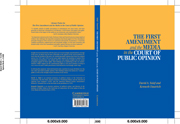Book contents
- Frontmatter
- Contents
- List of Tables and Figures
- Preface and Acknowledgments
- 1 Freedom of the Press and the Power of Public Opinion
- 2 Surveying the Public on Press Freedoms
- 3 What Americans Know About the Freedom of the Press
- 4 Public Support for the Freedom of the Press
- 5 Support for Press Freedoms Across Media: Comparing Print, Electronic, and the “New Media”
- 6 Support for Press Freedoms within a Medium: Elite, Mainstream, and Tabloid News Sources
- 7 Public Opinion, the First Amendment, and the Challenges of the Twenty-First Century
- Appendix: Annotated Questionnaires
- References
- Index
4 - Public Support for the Freedom of the Press
Published online by Cambridge University Press: 05 June 2012
- Frontmatter
- Contents
- List of Tables and Figures
- Preface and Acknowledgments
- 1 Freedom of the Press and the Power of Public Opinion
- 2 Surveying the Public on Press Freedoms
- 3 What Americans Know About the Freedom of the Press
- 4 Public Support for the Freedom of the Press
- 5 Support for Press Freedoms Across Media: Comparing Print, Electronic, and the “New Media”
- 6 Support for Press Freedoms within a Medium: Elite, Mainstream, and Tabloid News Sources
- 7 Public Opinion, the First Amendment, and the Challenges of the Twenty-First Century
- Appendix: Annotated Questionnaires
- References
- Index
Summary
As we argued in Chapter 1, the continued vitality of a free press in a democracy requires first and foremost that the constitutionally guaranteed freedom of the press achieve and maintain a high level of public support. When the public is dissatisfied with the performance of the actors and organizations that compose “the press,” its attitudes about press freedoms can turn negative. Can the public's affinity for those freedoms be sustained in the face of widespread public unhappiness with how particular actors and institutions in the media perform? Unless the reservoir of good will is operating at a sufficient level, support for a robust press may fall to levels below what might be considered acceptable in a democratic society dependent on a flourishing “marketplace of ideas.” Given the current low levels of satisfaction with and perceived poor performance of the news media, it is particularly important to consider the state of Americans' support for press freedoms, which we do in this chapter.
A critical question now presents itself: How does one measure support for press freedoms? Even if we adhere to the premise that a robust press is critically important to democracy, there exist numerous methods by which we might test public support for its freedom.
- Type
- Chapter
- Information
- Publisher: Cambridge University PressPrint publication year: 2002

